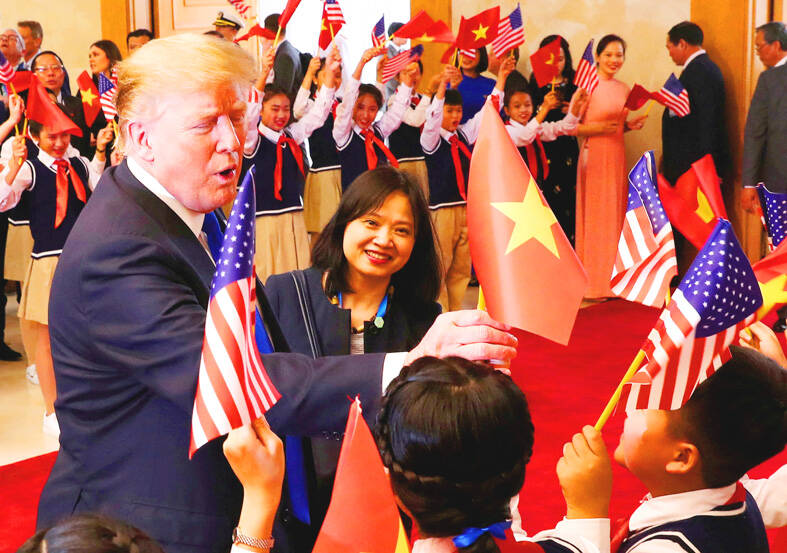Vietnamese and US companies have signed more than US$4 billion in deals, a petrochemical giant said yesterday, as anxiety mounts in Hanoi over potential tariffs under the administration of US President Donald Trump.
The Southeast Asian nation has the third-biggest trade surplus with the US, after China and Mexico — both targeted by Trump since he took office.
A statement posted by PetroVietnam Power Corp (PVPower) on its Web site said the new projects — in areas such as aviation, oil and gas exploration, and petrochemical imports — were worth about US$4.15 billion.

Photo: Reuters
The “highly meaningful” deals were aimed at establishing “balanced and harmonious” trade, and would create hundreds of thousands of jobs for workers in the two nations, PVPower said.
They were signed in the US on Thursday during a visit by Vietnamese Minister of Industry and Trade Nguyen Hong Dien to meet US Trade Representative Jamieson Greer in Washington.
Greer told Dien that Vietnam “needs to have stronger solutions to open the market and improve the trade balance,” according to a report on the Web site of the Vietnamese Ministry of Industry and Trade.
There is increasing worry in Hanoi that Vietnam could be the next target of Trump’s tariffs, which have sent shock waves through global markets.
Earlier, Hanoi said it was reviewing import duties on goods from the US. Vietnamese Prime Minister Pham Minh Chinh told US Ambassador Marc Knapper that the review would look to encourage increased imports of liquified natural gas, as well as agricultural and high-tech products, a report on the government’s Web site said on Thursday.
Chinh told Knapper that Vietnam was “actively addressing the current concerns of the US in economic-trade-investment relations.”
Vietnam was also “reviewing import tariffs on goods from the United States, encouraging increased imports of key US products that Vietnam needs, especially agricultural products, liquefied gas and high-tech products,” the report said.
The US trade deficit in goods with Vietnam was US$123.5 billion last year, up more than 18 percent on 2023, according to the Office of the US Trade Representative.

TAKING STOCK: A Taiwanese cookware firm in Vietnam urged customers to assess inventory or place orders early so shipments can reach the US while tariffs are paused Taiwanese businesses in Vietnam are exploring alternatives after the White House imposed a 46 percent import duty on Vietnamese goods, following US President Donald Trump’s announcement of “reciprocal” tariffs on the US’ trading partners. Lo Shih-liang (羅世良), chairman of Brico Industry Co (裕茂工業), a Taiwanese company that manufactures cast iron cookware and stove components in Vietnam, said that more than 40 percent of his business was tied to the US market, describing the constant US policy shifts as an emotional roller coaster. “I work during the day and stay up all night watching the news. I’ve been following US news until 3am

Six years ago, LVMH’s billionaire CEO Bernard Arnault and US President Donald Trump cut the blue ribbon on a factory in rural Texas that would make designer handbags for Louis Vuitton, one of the world’s best-known luxury brands. However, since the high-profile opening, the factory has faced a host of problems limiting production, 11 former Louis Vuitton employees said. The site has consistently ranked among the worst-performing for Louis Vuitton globally, “significantly” underperforming other facilities, said three former Louis Vuitton workers and a senior industry source, who cited internal rankings shared with staff. The plant’s problems — which have not

TARIFF CONCERNS: The chipmaker cited global uncertainty from US tariffs and a weakening economic outlook, but said its Singapore expansion remains on track Vanguard International Semiconductor Corp (世界先進), a foundry service provider specializing in producing power management and display driver chips, yesterday withdrew its full-year revenue projection of moderate growth for this year, as escalating US tariff tensions raised uncertainty and concern about a potential economic recession. The Hsinchu-based chipmaker in February said revenues this year would grow mildly from last year based on improving supply chain inventory levels and market demand. At the time, it also anticipated gradual quarter revenue growth. However, the US’ sweeping tariff policy has upended the industry’s supply chains and weakened economic prospects for the world economy, it said. “Now

UNCERTAINTY: Innolux activated a stringent supply chain management mechanism, as it did during the COVID-19 pandemic, to ensure optimal inventory levels for customers Flat-panel display makers AUO Corp (友達) and Innolux Corp (群創) yesterday said that about 12 to 20 percent of their display business is at risk of potential US tariffs and that they would relocate production or shipment destinations to mitigate the levies’ effects. US tariffs would have a direct impact of US$200 million on AUO’s revenue, company chairman Paul Peng (彭雙浪) told reporters on the sidelines of the Touch Taiwan trade show in Taipei yesterday. That would make up about 12 percent of the company’s overall revenue. To cope with the tariff uncertainty, AUO plans to allocate its production to manufacturing facilities in